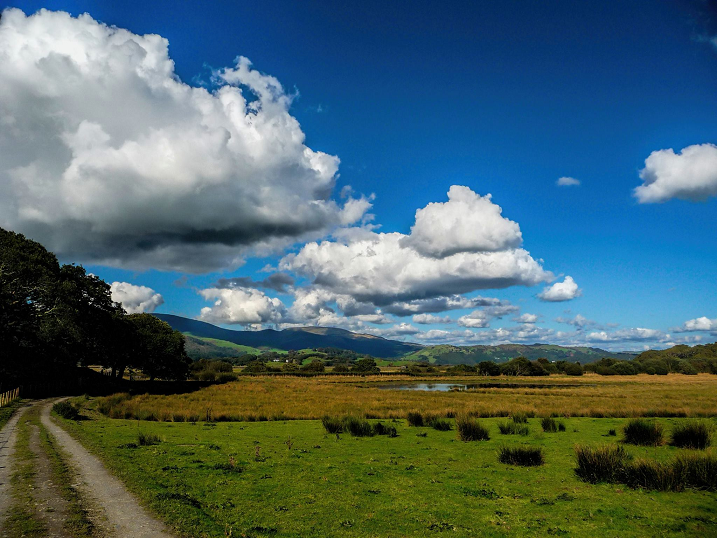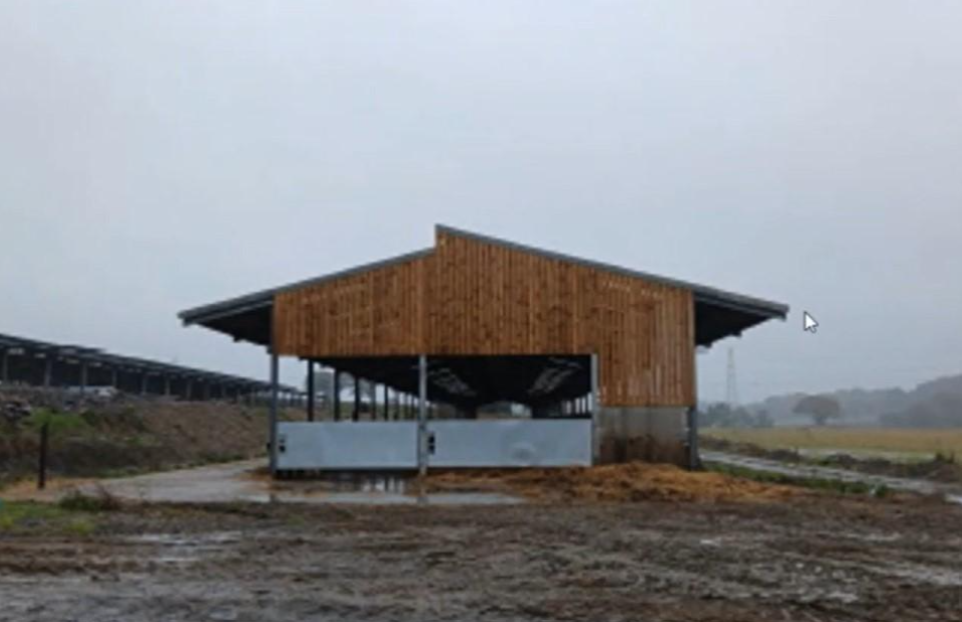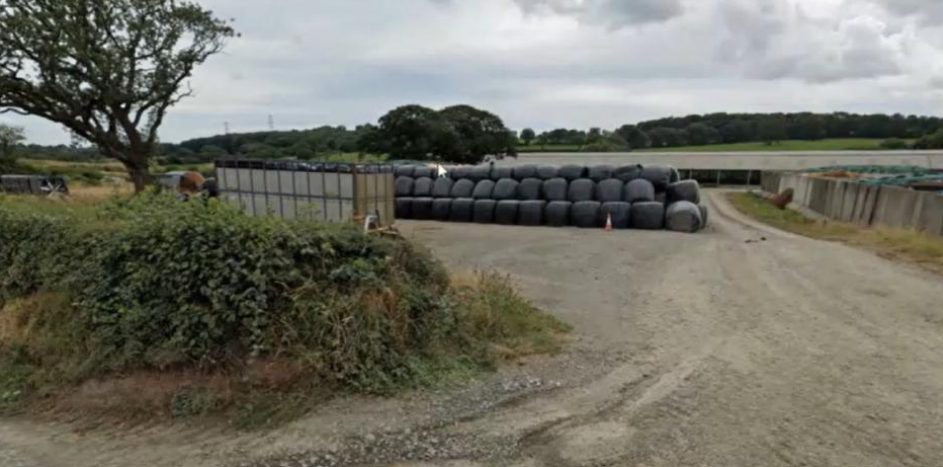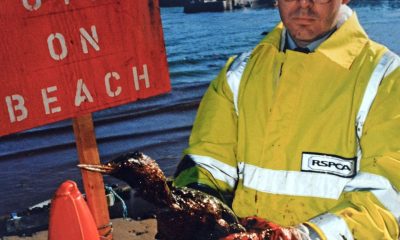Farming
Delay to Sustainable Farm Scheme ‘is bad news for farmers’ says Trust

THIS week the Welsh Government announced that Sustainable Farming Scheme has been delayed by a year. Wildlife Trusts Wales believe this is bad news for farmers, nature and climate. The post-Brexit farm payment scheme offers a once-in-a-lifetime opportunity to put farming in Wales on a sound sustainable footing to address the interlinked climate and nature crises and ensure a viable future for Welsh farming.
The decision to delay the scheme comes at a time when Welsh farmers are suffering from the effects of months of heavy rain. This is placing farm businesses under increasing strain, which will only get worse as our climate changes. The UK Government’s 2021 Food Security Report found that, “The biggest medium to long term risk to the UK’s domestic production comes from climate change and other environmental pressures like soil degradation, water quality and biodiversity.”
Rachel Sharp, Director of Wildlife Trusts Wales says: “The decision to delay the scheme simply prolongs the uncertainty at a time when farmers need to be rewarded for switching to sustainable farming methods which will benefit their businesses in the future. Delaying measures to help farms adapt to our changing climate now only increases costs tomorrow and so is bad news for farm incomes. The scheme offers a great opportunity for farmers to be on the front foot to address the changing weather – to plant trees for shelter for livestock, to switch to herb-rich grasses which are less prone to drought, and to store water in ponds on farms.
“It’s clear that the current food system isn’t working for farmers, nature, climate and even consumers. We see nature in rapid decline on some farmland, rivers polluted from agricultural run-off and many farmers struggling to make their businesses viable. Although the extra year will give further time for farmers’ concerns to be heard, it is vital to be lead by science.”
Most Welsh farms already have 6% tree cover and so do not have far to go to meet the proposals to reach 10% under the new scheme – trees benefit the farm through providing shelter for livestock, protect soil and to soak up flood waters. These areas do not have to come out of production because grazing beneath the trees is allowed.
Rachel Sharp continues: “It is a critical time for farming in Wales and it’s important that the new scheme is adequately funded. We need to see the whole scheme rolled out in 2026 as farmers need clarity on all tiers of the scheme including the ‘Options’ and ‘Collaborative’ tiers. Farmers need to know what payment rates will be available to plan for their business. This year will be critical and piloting new approaches is needed so that farmers can see what the new scheme looks and feels like. As 90% of Wales is farmland there is huge potential to harness nature to help store carbon and to hold back flood waters in revitalised natural habitats and to mitigate the impacts of climate change for the people of Wales. This would then demonstrate the value of giving taxpayers’ money to farmers for public benefits that, in turn, support rural communities.”
Nature is continuing to decline at an alarming rate across Wales, which is already one of the most nature-depleted countries in the world. 18% (one in six) of species are at risk of extinction from Wales. The abundance of land and freshwater species has on average fallen by 20% across Wales since 1994.
Farming
Performance recording transforms hill flock at Llysfasi college farm

A WELSH college farm is successfully lambing triplet-bearing ewes outdoors on exposed hill ground after introducing genetic performance recording to strengthen maternal traits and flock resilience.
At Coleg Cambria Llysfasi, near Ruthin, a flock of 120 pure Welsh Mountain ewes grazes land rising between 1,000 and 1,300 feet above sea level, where winter conditions can be harsh and only the hardiest sheep thrive.
Since joining the Farming Connect Welsh Sheep Genetics Programme in 2023, the farm has used Estimated Breeding Values (EBVs) to target improvements in maternal ability, growth rates and overall performance. Although genetic gains are often gradual, staff say results are already clear just three years into the scheme.
Historically, ewes carrying triplets were lambed indoors, adding labour and cost. Now, improved maternal strength means they can lamb outside with minimal intervention.

“The ewes are holding their body condition better, we haven’t had any problems lambing them outdoors and they keep their lambs very well,” said shepherd Alun Jones. “We’re seeing fewer losses and far less hands-on work. In the 2025 season we only assisted two ewes out of 120.”
The wider system runs 600 ewes, including Welsh Mountains crossed with Abertex to produce mule ewe lambs, and mules crossed with Beltex or Texel rams for finishing lamb production. Plans to phase out the Welsh Mountain breed were reversed after recognising its value for hardiness and mothering ability in upland conditions.
Performance recording began in autumn 2023 with tissue samples, body condition scoring and regular weighing to create a reliable data baseline.
“Before, we were judging by eye,” said Mr Jones. “Now we’ve got hard evidence to guide decisions.”
By identifying and removing the bottom 20 per cent of performers, the flock’s overall index has risen from £13 to £16.24 — a significant lift in commercial potential.
Lambs are currently creep-fed and sold from November to January at 38–42kg liveweight, with a longer-term aim to finish earlier and reduce concentrate use.
Farm manager Dewi Jones said the data has also changed how they buy rams.
“When you’re at a sale and you’ve got the indexes in front of you, you can draw a red line through the animals that don’t stack up. Type still matters, but figures matter just as much. Data gives you confidence in your choices.”
Some home-bred ram lambs are now matching the performance of sale-topping sires, creating opportunities to retain or market their own breeding stock.
Mr Jones believes the sheep sector could benefit from taking a more data-driven approach, similar to dairying.
“If we don’t measure, we can’t improve. Recording takes time, but the rewards are there. It’s about working smarter and building a more resilient flock for the future.”
Shepherd Alun Jones with Welsh Mountain ewes at Llysfasi.
Performance recording and weighing form a key part of the improvement programme.
Business
Langdon Mill Farm Pembrokeshire expansion signed off

THE FINAL sign-off for plans for a heifer accommodation building and associated works at one of Pembrokeshire’s largest dairy farms, with a milking herd of 2,000 cows, have been given the go-ahead.
In an application backed by councillors at the December meeting of Pembrokeshire County Council’s planning committee, Hugh James of Langdon Mill Farms Ltd sought permission for a 160-metre-long heifer accommodation building, a slurry separation/dewatering building and associated yard areas at 1,215-hectare Langdon Mill Farm, near Jeffreyston, Kilgetty.
A supporting statement through agent Reading Agricultural Consultants said: “The holding currently has a milking herd of approximately 2,000 cows, which are housed indoors for the majority of the year, with dry cows and heifers grazed outdoors when weather and soil conditions permit.

“There has been significant investment in buildings and infrastructure at the farm over the last decade in respect of cattle accommodation, slurry storage, milking facilities, Anaerobic Digestion (AD) plant, feed storage. Recently a calf and weaned calf accommodation buildings were approved by Pembrokeshire County Council with construction almost complete.
“The unit is efficient, achieving yields of more than 10,000 litres/cow/year, with cows being milked three times/day in the 60-point rotary parlour. Langdon Mill Farm currently directly employs 21 full-time, and three part-time staff. Of these, four live on site in the two dwellings opposite the farm, with the remaining staff living in the locality.”
It added: “Although the unit has previously purchased heifers to aid expansion, the farm now breeds most of its own replacements to improve genetics and to minimise the ongoing threat of bovine tuberculosis (bTB).”
It said the proposed building would be used by heifers between the ages of 7-22 months, the siting “directly influenced by the adjacent calf and weaned calf buildings, with livestock being moved from one building to the next as they get older”.
Members unanimously supported the recommendation of approval, giving delegated powers to the interim head of planning to approve the application following the final approval of a habitats regulations assessment.
An officer report published yesterday, February 5, said Natural Resources Wales confirmed it had received the assessment, and, “in consideration of the mitigation measures detailed and on the understanding there is no increase in stock, they agree with the LPA’s conclusion that an adverse effect upon the integrity of the SAC [Special Areas of Conservation] sites can be ruled out”.
Formal delegated approval has now been granted by officers.
Farming
Forgotten meats tipped as future ‘superfood’ comeback

SO-CALLED “forgotten meats” such as liver, heart and kidneys could soon find their way back onto dinner plates, with scientists suggesting they may offer a cheap, sustainable and highly nutritious alternative to modern ultra-processed foods.
Offal was once a staple of everyday diets across the UK, particularly in working-class households, but has steadily fallen out of favour in recent decades despite being rich in iron, protein and essential vitamins.
Now researchers at Aberystwyth University are working with Hybu Cig Cymru (HCC) to understand why demand has dropped and whether these cuts could be repositioned as affordable “superfoods”.
Scientists say that when nutrient-dense parts of the animal go uneaten, valuable food is effectively wasted.
Dr Siân Mackintosh, from the university’s Institute of Biological, Environmental and Rural Sciences (IBERS), said these meats could play an important role in healthier and more sustainable diets.
“Where they are not being used, these nutrient-dense ‘forgotten meats’ represent a significant loss of nutrients from our food chain,” she said. “Incorporating them as part of a balanced diet could support human health while also reducing food waste and improving environmental outcomes.”
Taste tests win over public
To test public attitudes, HCC staff have been running tasting sessions at major agricultural events including the Royal Welsh Show and the Winter Fair in Llanelwedd.
Visitors sampled dishes made with Welsh lamb’s liver, including stroganoff, traditional faggots and pâté. Organisers say many people were surprised by the flavour and keen to learn how to cook them at home.
Dr Eleri Thomas, Future Policy and Project Development Executive at HCC, said interest was stronger than expected.
“We believe there is significant potential for these forgotten meats to be incorporated back into our diets,” she said. “Consumers liked the flavour and wanted recipes and cooking tips, as well as understanding the nutritional value.”
She added that making better use of undervalued cuts could improve sustainability across the meat supply chain while creating new marketing opportunities for Welsh producers.
Part of wider sustainability project
The work forms part of the SMART Nutrient Cymru project, funded through the Welsh Government’s innovation support scheme.
Project lead Dr Christina Marley said the aim is to capture nutrients currently being lost across the agri-food system.
Alongside the collaboration with HCC, the team has also partnered with Dŵr Cymru Welsh Water on land management to protect rivers, and with British Wool to explore new uses for fleece by-products.
IBERS itself is one of eight UK research institutes strategically supported by Biotechnology and Biological Sciences Research Council, providing national expertise in grassland and plant breeding science.
Researchers say that with food prices rising and pressure growing to reduce waste, traditional nose-to-tail eating could offer both economic and environmental benefits.
Image: Welsh lamb faggots (Pic: HCC)
-

 Health7 days ago
Health7 days agoHealth board targets rise in steroid and gym drug use across west Wales
-

 Health21 hours ago
Health21 hours agoHealth Board to decide future of nine key services at two-day meeting
-

 Crime7 days ago
Crime7 days agoTeacher injured and teenager arrested for attempted murder at Milford Haven School
-

 Business3 days ago
Business3 days agoComputer Solutions Wales under fire from customers
-

 Business6 days ago
Business6 days agoSix-figure negligence victory leaves retired builder trapped in divorce limbo
-

 News7 days ago
News7 days agoReform appoints Dan Thomas to lead party in Wales
-

 Sport7 days ago
Sport7 days agoWales name squad for Six Nations opener against England
-

 Business5 days ago
Business5 days agoMinimum alcohol price to rise by 30 per cent as retailers warn of border impact



























